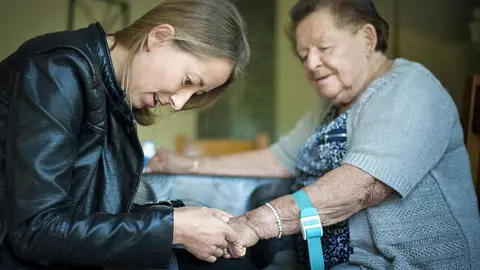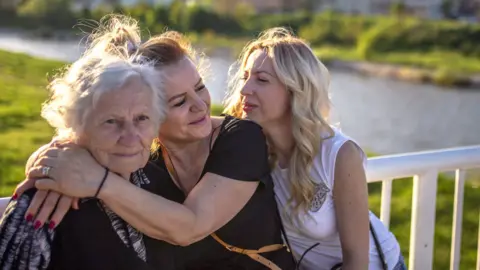Overstretched 'sandwich carers' trying to help parents and children
 Getty Images
Getty ImagesAn exhausted, overstretched generation of carers, are in need of emotional support themselves, say researchers.
A report from the Office for National Statistics (ONS) says more than a quarter of such "sandwich carers" are suffering from depression or stress.
"Sandwich carers" look after their elderly parents and their children.
There are 1.3 million people in the UK with such multi-generational caring responsibilities, say researchers, with many feeling ignored and undervalued.
The ONS says the numbers in this "sandwich" generation, often in their 40s and 50s, are being increased by a combination of longer life expectancy and women tending to have children later in life.
 Getty Images
Getty ImagesBut the report warns of the hidden pressures being carried by these mid-life carers - with warnings that they can be worn down emotionally, physically and financially.
The majority of carers in this "sandwich generation" are women - and almost half of these women feel that they cannot work as many hours as they would like.
One in three sandwich carers say that financially they are "just about getting by".
For those with more than 20 hours per week of caring, the ONS says a third are experiencing some kind of mental health problems, which might be stretched out over many years.
They risk becoming isolated, running out of money and being constantly under pressure - while trying to juggle between responsibilities of care, work and their own relationships.
What's it like?
Sarah, a 52-year-old mother of five children, lives in London, where she looks after her mother-in-law, who has dementia.
The work of carers is "completely undervalued," she says.
 Getty Images
Getty ImagesIn fact, she says it makes her angry when in questionnaires carers are categorised as "not working", when they never stop working, often to the detriment of their own health.
Even though this affects a "massive number of people", Sarah says much of this huge and unrelenting responsibility goes by without being recognised.
"There is no spare time at all and you can get very tired," she says.
Sarah says she has a good network of support around her, but there is still a residual sense of guilt about whether she is spending enough time with her children or her mother-in-law, as she tries to stretch herself across helping all of them.
'Lose touch with friends'
The people who are often most neglected are the carers themselves, and she says it would be easy for someone to get "unwell".
"You can lose touch with friends, when it's hard to see people," she says.
Going out together as a family becomes difficult and holidays become limited, at a time in life when people might be expecting to enjoy some travelling.
 Getty Images
Getty ImagesSarah says it is important to resist the "feeling of horizons being limited".
"You could easily feel that your life is getting narrower."
Her mother-in-law had previously lived alone in Dorset, and Sarah says that created another set of pressures, needing hours of travel, sometimes at short notice.
But she says it is worth it and feels that it is the right thing to do - but Sarah says that there needs to be much more openness about the stress and struggles facing so many people in her generation.
'So exhausted'
Catherine, aged 61, living in Cheshire, helps her 89-year-old mother at the same time as caring for her daughter, who has cerebral palsy.
The emotions can be a "roller coaster", she says, with some very low dips, such as if there are problems with navigating the care system.
A big practical problem, she says, is the shortage of reliable carers and the difficulties created when there are interruptions and gaps in staff available.
 Getty Images
Getty ImagesCatherine says she has sometimes spent a fortnight as the sole carer, through nights and days.
"I couldn't speak in full sentences, I was so exhausted," she said.
She says that other people are not "heartless", but they fail to see the extent to which carers can be trapped and unable even to get out of their house.
Even simple things like going for a walk have to be planned, Catherine says.
Carers find their own release from stress, she says, and in her own case she says that she "knits, knits, knits", as a hobby.
"Good friendships" have been very important to her, she says, otherwise people can become very isolated and feel all the weight on their shoulders.
But she warns that carers can sometimes feel excluded and neglected by neighbours who might be "afraid of saying the wrong thing".
She says that caring has its own lessons - and she has learned to "live in the moment" and enjoy what she can.
"How many other people get pleasure from getting out to the supermarket?" says Catherine.
'Time-poor and stressed'
This is a growing problem for a "time-poor and stressed" generation, says Helen Walker, chief executive of the Carers UK charity.
 Getty Images
Getty ImagesAs well putting pressure on health and wellbeing, it is also tough on those balancing being a carer with their own jobs.
The charity estimates that about two million people have left work as a result, with consequences for their finances and careers.
Both Sarah and Catherine spoke of the difficulties in having to negotiate the care and health support system for their relatives, and Carers UK says getting the right care for the elderly is often tougher than getting childcare.
"With the social care system under extreme pressure, additional stress is being placed on families who are trying to juggle children, work and older relatives," says Ms Walker.
